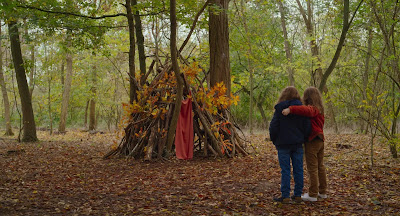“Petite Maman” is told through the eyes of a child. This is made clear in the opening handheld image of an older woman in a retirement home before the camera drifts back to reveal eight-year-old Nelly (Joséphine Sanz) is standing beside her, saying goodbye the way you would ritually bid goodbye to someone at the end of a day. Indeed, the camera proceeds to follow Nelly as she then walks down a hallway, going from room to room, bidding goodbye to other retirees, before winding up in another room with her mother Marion (Nina Meurisse).There Nelly has no one to say goodbye to and she verbally expresses regret at not getting to say goodbye to the room’s resident – or, former resident, we glean – properly. Sciama is judicious here, not straightforwardly disclosing the missing person was Nelly’s now deceased grandmother, preferring to let us glean it from the unspoken details. Later, in driving to her grandmother’s house in the countryside to begin the process of clearing it out, Nelly shares a sweet scene with her mother by indulging in a backseat apero hour, though a later scene at home before bed suggests a small rift between the two. The next morning when Nelly wakes up, she discovers her mother has left with just her father (Stéphane Varupenne) there instead, not coincidentally keying into that same establishing feeling of all-of-the-sudden departures. And then Nelly goes into the backyard and, well, this is perhaps where we will advise the more spoiler-phobic among us to please exit the review.
That is not to suggest “Petite Maman” has anything like a “Sixth Sense”-twist. No, there is a twist, but the A Ha is more gradually evinced. The woods, both in their very idea as woods and the way Sciama shoots them with great color and little sunlight, puts one in the mind of a fairytale. And soon, Nelly has met a young girl, Marion (Gabrielle Sanz), cough cough, who looks an awful lot like her. When Marion invites Nelly over to her house, Nelly notices the house looks eerily similar to her grandmother’s, and the way she moves through the halls and rooms, picking out exactly what is similar, gives the scene an unspoken energy that we the audience are picking up on too, and at virtually the same rate. If this was another movie, the mood might have been more in the vein of horror, or mystery, or suspense, deliberately withholding to eventually shock us. But Sciama’s shunning of aesthetic embellishment means the tone skews more toward quiet, matter of fact discovery, a whole movie made in the space of that story Jesse tells in “Before Sunrise” about seeing his dead grandmother in the mist of a garden hose, becoming a kind of innate expression of how children are always more in tune with what’s going on in the world around them than adults might think, and enhanced by how the child actors are never asked to do too much, the natural straight forwardness of these performances movingly bringing home the kind of implicit clarity only a child can provide.




No comments:
Post a Comment